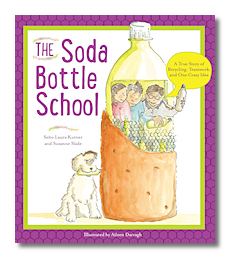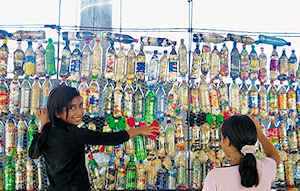 As a nonfiction children's author I'm often asked, "How do you find new book ideas?" Students are usually surprised when I explain I don't have to look for book ideas—they find me! For example, when I visited Washington D.C. during a summer vacation in 2011, I checked out the annual Folklife Festival on the National Mall lawn. With a long list of story ideas waiting to be written on my desk back home, finding a new book idea was the farthest thing from my mind, until I saw it—a colorful plastic wall, three feet high, sparkling in the afternoon sun.
As a nonfiction children's author I'm often asked, "How do you find new book ideas?" Students are usually surprised when I explain I don't have to look for book ideas—they find me! For example, when I visited Washington D.C. during a summer vacation in 2011, I checked out the annual Folklife Festival on the National Mall lawn. With a long list of story ideas waiting to be written on my desk back home, finding a new book idea was the farthest thing from my mind, until I saw it—a colorful plastic wall, three feet high, sparkling in the afternoon sun.
As I approached the plastic structure, I noticed children stuffing plastic bags and trash into soda bottles with sticks. They placed the trash-filled bottles inside a frame made of wood and chicken wire. Nearby, a poster held photos of children constructing tall plastic walls—an entire building—out of trash!
The display explained how the tiny Guatemalan town of Granados (population 847) was facing two problems in 2007: their trash piles were too big and their elementary school was too small. The village had no garbage dumps. No recycling centers. No place to put the soda and water bottles, plastic bags, and trash created by products arriving from other countries. Also, their elementary school, the Escuela Oficial Urbana Mixta de Granado, had become extremely crowded. Two grades shared one classroom. Two students sat at one desk.
The situation looked hopeless. Then the villagers got this crazy idea. Could they build new schoolrooms out of their trash? No one knew if the crazy idea would work, but everyone was willing to try.
 Over two hundred children, along with teachers, parents, and grandparents, helped with the project. They worked seven days a week, collecting, cleaning, and stacking bottles. After fifteen months of hard work, they miraculously turned their ugly trash into a beautiful school. One problem had solved another. I couldn’t believe it! And that’s when it happened—goosebumps. (I always get goosebumps when a new story finds me.)
Over two hundred children, along with teachers, parents, and grandparents, helped with the project. They worked seven days a week, collecting, cleaning, and stacking bottles. After fifteen months of hard work, they miraculously turned their ugly trash into a beautiful school. One problem had solved another. I couldn’t believe it! And that’s when it happened—goosebumps. (I always get goosebumps when a new story finds me.)
I was inspired by this incredible project, and immediately wanted to share it with young readers. Yet, I wasn’t sure I could find enough time in my schedule for the in-depth research this story would require. (And I did have that long list of story ideas waiting back home.) Then I considered the extraordinary teamwork it took to complete this huge project. I looked at the determined, smiling faces of the children in the photos, and suddenly, the Soda Bottle School moved to the top of my writing list.
I introduced myself to the woman in charge of the exhibit, Laura Kutner, and explained I was a children’s author. Laura turned out to be the teacher who had initiated the building project, and she was excited about the idea of sharing the school’s story. After I returned home to Chicago we chatted more over the phone, and Laura accepted my invitation to co-author a children’s story about the bottle school.
 Laura’s personal connection with the project and the villagers was invaluable during the writing process. She patiently answered hundreds of my questions. She explained the building project in detail. First, the students collected over six thousand bottles. They carefully washed every one and set them in the sun to dry. Then the students filled each bottle with about two hundred and fifty old grocery and chip bags. Two hundred and fifty! They called the stuffed bottles eco-ladrillos, or eco-bricks. The bottle stuffing process took six months and most children ended up with blisters on their hands. Then the students stacked the eco-ladrillos between chicken wire fastened to a metal frame to create the walls. After local masons covered the walls with a thin layer of cement, students painted the outside of the school their principal’s favorite color, orange.
Laura’s personal connection with the project and the villagers was invaluable during the writing process. She patiently answered hundreds of my questions. She explained the building project in detail. First, the students collected over six thousand bottles. They carefully washed every one and set them in the sun to dry. Then the students filled each bottle with about two hundred and fifty old grocery and chip bags. Two hundred and fifty! They called the stuffed bottles eco-ladrillos, or eco-bricks. The bottle stuffing process took six months and most children ended up with blisters on their hands. Then the students stacked the eco-ladrillos between chicken wire fastened to a metal frame to create the walls. After local masons covered the walls with a thin layer of cement, students painted the outside of the school their principal’s favorite color, orange.
When the school was finished, the village threw a huge fiesta complete with streamers, signs, and traditional Mayan dancing. Their new school had started with one crazy idea, but became a reality due to teamwork. It was a truly inspiring story. Now Laura and I had to figure out the best way to tell it.
After several weeks of writing, we had a solid first draft. Then we rewrote the story from several points of view in search of the most meaningful way to share it with children. Somewhere around revision 138 (seriously) we decided to try telling the story through the eyes of a student—a fourth grader named Fernando who was especially enthusiastic throughout the long, grueling building project.
 With Fernando and his mother’s permission, we began revising again. Right away we felt this version was different—special. Critiquers confirmed it conveyed the Granados school project in an engaging, personal, and authentic way. Before long (in publishing time), the story was picked up by the perfect publisher. The publisher selected an illustrator, and months later Laura and I were asked to review preliminary sketches. Everyone wanted to make sure the book was inspiring, engaging, and of course, factually correct. While the final illustrations were being painted, we did a few more manuscript revisions.
With Fernando and his mother’s permission, we began revising again. Right away we felt this version was different—special. Critiquers confirmed it conveyed the Granados school project in an engaging, personal, and authentic way. Before long (in publishing time), the story was picked up by the perfect publisher. The publisher selected an illustrator, and months later Laura and I were asked to review preliminary sketches. Everyone wanted to make sure the book was inspiring, engaging, and of course, factually correct. While the final illustrations were being painted, we did a few more manuscript revisions.
I’m so grateful the idea for “The Soda Bottle School: The True Story of Recycling, Teamwork, and One Crazy Idea” found me in 2011. Three years later, the book has finally been released! You can learn more about that here.
While the story shares an inspiring message of creative recycling and teamwork, the book itself will help to keep our planet clean. I’m donating my proceeds from the book to help fund new bottle school through a nonprofit organization called Hug-It-Forward. Laura is donating her profits from the book to Trash For Peace, a nonprofit organization which promotes environmental education and ideas for upcycled/recycled projects such as these awesome recycle bins made out of plastic bottles (Download the free instruction manual here.)
Suzanne Slade is the award winning author of more than 100 nonfiction books for children. Her recent picture books include "The House That George Built" (a Junior Library Guild Selection, a Bank Street College Best Book of the Year), "Climbing Lincoln's Steps" (Notable Social Studies Trade Books for Young People, Paterson Prize for Books for Young People), and "Multiply On The Fly" (California Reading Association Eureka! Silver Award, ILLINOIS READS selection.) Look for her new 2014 releases: "The Soda Bottle School," "Friends for Freedom," and "With Books and Bricks: How Booker T. Washington Built a School."